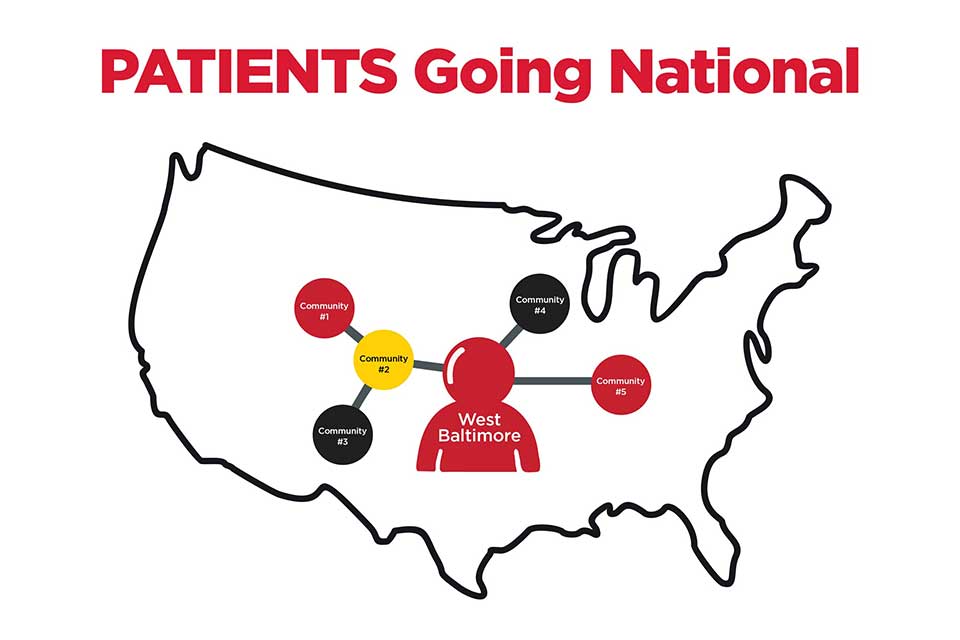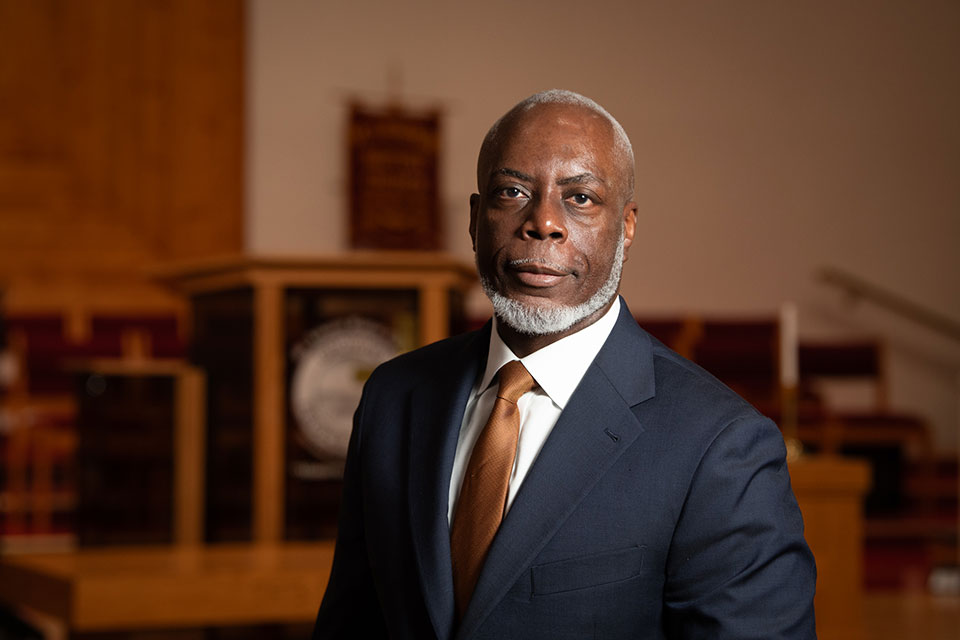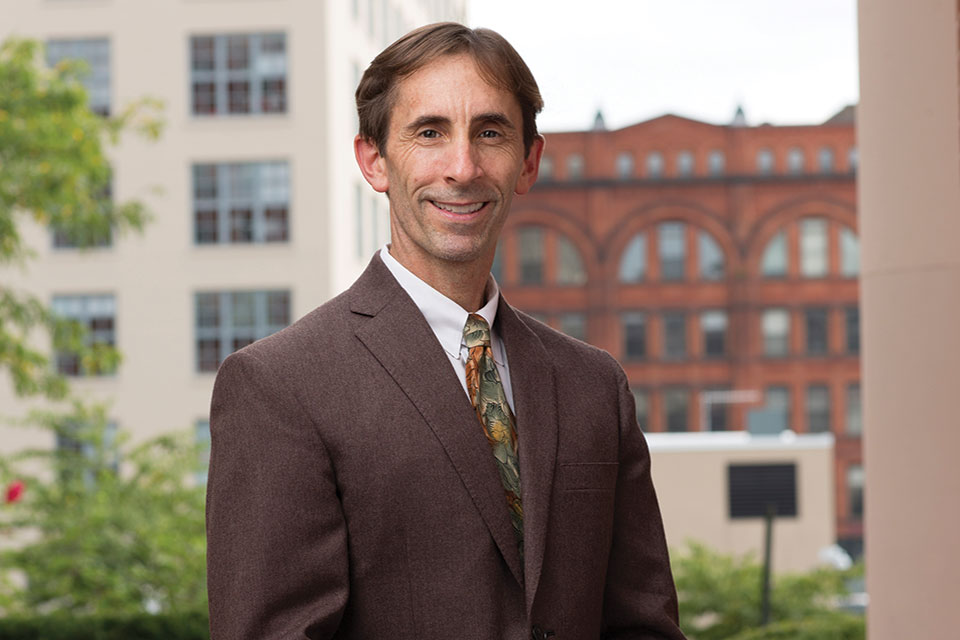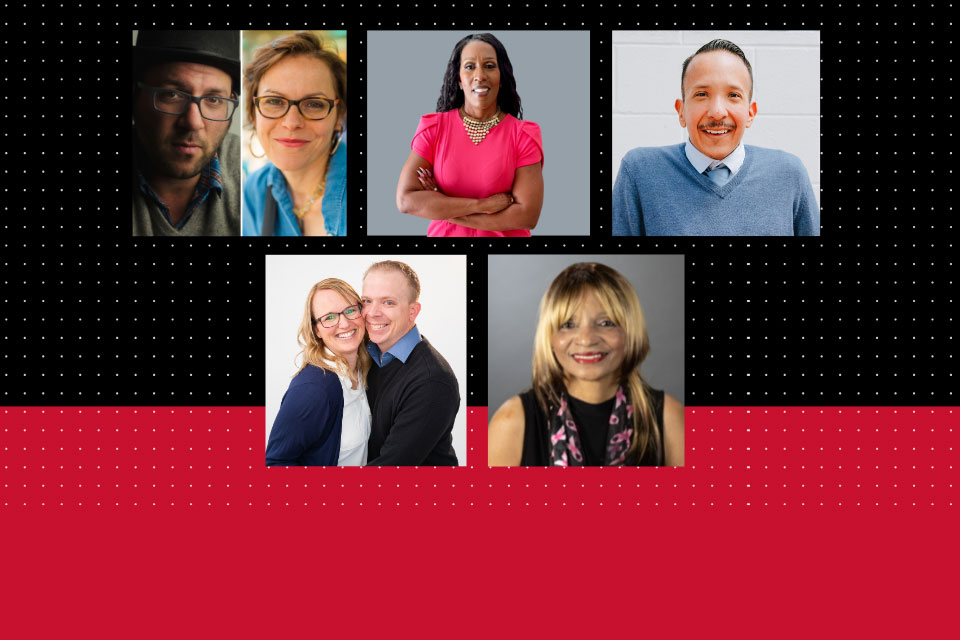PATIENTS Program Launches PATIENTS Going National Initiative
New effort will allow the PATIENTS Program to expand its impact on communities to a national level.

By Emily Parks
January 15, 2025
The PATIENTS Program, a community-academic research infrastructure at the University of Maryland School of Pharmacy, is expanding its work to impact communities on a national level after years of success in West Baltimore.
The initiative — PATIENTS Going National — officially kicked off on Dec. 6 with a meeting of the PATIENTS Program’s Steering Committee, the executive director’s advisory board, sponsors, and staff. Preliminary work on defining and prioritizing the focus of a national program was presented for feedback.
For the past 13 years, the PATIENTS Program has worked to transform research one community at a time by creating a path for health equity through working with communities of patients, their care providers, and policy makers to help co-develop research.
“The PATIENTS Program has a deep understanding of how to effectively partner with communities using the 10-Step Framework for Continuous Patient Engagement that we developed in 2012,” said C. Daniel Mullins, PhD, professor of practice, sciences, and health outcomes research at the School of Pharmacy and executive director of the PATIENTS Program. “We have continued to develop the evidence base for what authentic, trustworthy research and community-academic partnerships look like. Other research institutions use our methods and tools for local application of our evidence-based approach to patient-centered research. That motivated us to have a greater national impact by expanding the reach of our program so that many more patients and communities can be healthier because of our research.”
PATIENTS Going National will scale up the program’s evidence-based approach for patient and community engagement to increase the reach and impact of the PATIENTS Program to communities in addition to West Baltimore. After speaking with patients, community leaders, advisors, and research participants, the program opted to look beyond geography with its national initiative and to instead look at different types of communities.
The PATIENTS Program uses the term “community” to refer to any way in which patients or individuals come together around something they share in common, recognizing that despite that common identity the community may – and typically will be – quite diverse.
The PATIENTS Program views communities in this context not as passive recipients of interventions, but rather as active co-developers in the research process through continuous and sustained engagement.
“This approach allows patients and people to identify themselves and their communities rather than be labeled by disconnected outsiders,” said Mullins. “For geographic communities, this avoids labeling people based on their zip code. For disease states, this supports patient communities in shaping research priorities and ensuring culturally relevant solutions that reflect the lived realities of individuals facing these challenges. For faith-based and other civic organizations, this leverages individual and organizational influence and ability to mobilize underrepresented communities, especially marginalized communities where trust in health care and research may be low.”
“A community represents a connected group that has a need, is open to actively participating in research with the PATIENTS Program and perceives the potential for a research partnership with the PATIENTS Program as mutually beneficial,” he added.
The communities with whom the PATIENTS Program is seeking to build partnerships are:
- Black/African American
- Cancer
- Cardiovascular Disease
- Community Clinics, Health Systems, Hospitals
- Disability
- Mental Health
- Older Adults/Seniors
- Reproductive Health Care
The communities were chosen based on their alignment with the PATIENTS Program’s strategic plan, the reach and size of the community, and the likely impact on advancing health equity.
PATIENTS Going National has $750,000 in funding from AstraZeneca, Bayer, and Novo Nordisk for capacity building and outreach efforts to effectively partner with communities. Final ones will be announced after a data-driven evaluation process to assure alliance with the PATIENTS Program’s mission and strategic plan.
Aurelia Laird, RN, BSN, a 30-year health care advocate and PATIENTS Program Steering Committee member, opened the Dec. 6 kickoff meeting with the PATIENTS Voice, a hallmark of the PATIENTS Program. She shared the program’s history and growth in the field of community continuous engagement and co-development of research.
Laird spoke of meeting Mullins when she was a research nurse and head of community research at Bon Secours Baltimore Health System.
“As I look back to where we started, how far we have come, how much we have learned, and how much we have accomplished while working together, it is evident to me that the PATIENTS Program is having a positive impact on the communities we serve,” she says. “The communities in return are motivated and empowered to build on what they have learned as well as encouraging others to participate along with them.”
Laird and Mullins are passionate about the work they do with the community in West Baltimore and the impact on patient health outcomes and trustworthiness.
As a result, patients and community members were less fearful of the word “research” and more willing to accept and participate in research activities.
PATIENTS Program Steering Committee, Advisory Board, and staff members were on hand at the kickoff for planning and discussion as were representatives from AstraZeneca, Bayer, and Novo Nordisk, all of which have enjoyed long-standing partnerships with the PATIENTS Program.
Rev. Franklin Lance, DMin, senior pastor at Baltimore’s Mount Lebanon Baptist Church and chair of the PATIENTS Program Steering Committee, spoke to the successes in their partnership.
“Through our partnership, we have demonstrated we can impact health equity here in Baltimore,” Lance said. “We’d like to replicate that in other community groups nationwide.”
The church’s partnership with the PATIENTS Program has grown from attending community events at the church to partnering on $1 million grant awards from federal agencies such as the National Institutes of Health (NIH). In 2022, the NIH funded the $1.2 million COmmunity Mistrust and Measures of Institutional Trustworthiness (COMMIT) award to create a sustainable model for trustworthy community-engaged research partnerships and organize a set of best practices around them.
Lance now serves as the community co-lead with the PATIENTS Program and other schools at the University of Maryland, Baltimore for the NIH’s Common Fund Community Partnerships to Advance Science for Society (ComPASS) program, which awarded $9.4 million to the PATIENTS Program to serve as a Health Equity Research Hub.
Discussions at the Going National kickoff event revolved around maintaining a relationship with a community after a clinical trial has been completed, the community engagement process with priority communities, and key messaging surrounding the initiative.
The PATIENTS Program is a recipient of funding from the U. S. Food and Drug Administration, the National Cancer Institute, the National Heart Lung and Blood Institute, the National Institute on Aging, the National Institute on Minority Health and Health Disparities, the Agency for Healthcare Research and Quality, and the Patient-Centered Outcomes Research Institute.
For Laird, the chance to do even more is exciting.
“I look forward to the day when we can work with communities and take our partnerships to an international level,” she said.
For the PATIENTS Program’s exciting 2025 kickoff podcast episode, Executive Director C. Daniel Mullins talks about the PATIENTS Program’s proven approach and vision for national replication. Check out the podcast episode to learn more about PATIENTS Going National.
Watch the full episode on our YouTube channel.
The PATIENTS Program would like to hear from leaders from the eight mentioned communities or obtain contacts from those communities. To connect with us, please email us at patients@rx.umaryland.edu.



